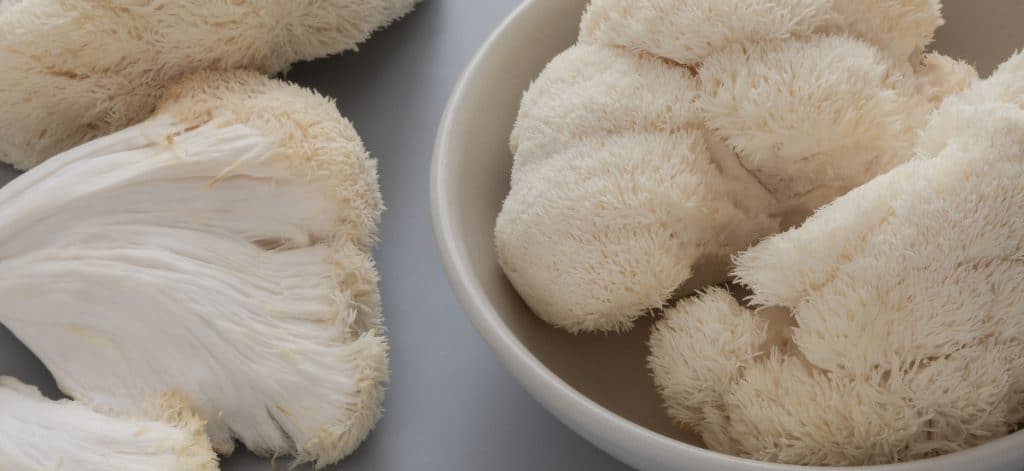Lion’s mane mushrooms (Hericium Erinaceus) are delicious edible and medicinal mushrooms best known for their ability to help improve brain function, boost immunity, and promote digestive health.
Instead of gills, these unusual-looking mushrooms have teeth or needles that hang downwards as they mature, giving them a shaggy look and the name lion’s mane.
Read on to learn more about lion’s mane mushroom health benefits, how to include lion’s mane in your diet and the potential side effects of consuming lion’s mane.
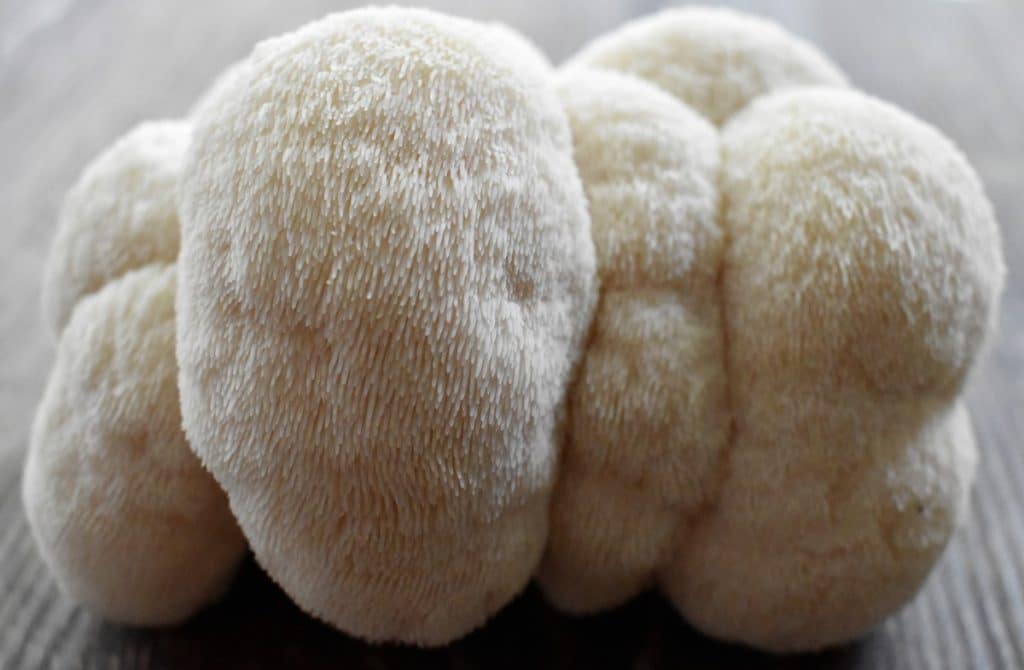
Lion’s Mane Mushroom Health Benefits
In the past, scientists used rats and mice for many of their lion’s mane studies, and there weren’t many human studies available to confirm they provide the same benefits for us.
But with the increased popularity of lion’s mane, scientists are beginning to focus on human trials to better understand the health benefits this remarkable mushroom offers.
Below we look at some of these benefits in more detail, and for those of you who prefer information in video format, we have created a video covering some of the most important lion’s mane health benefits.
Lion’s mane mushrooms have a lot to offer, including:
1. Enhancing Brain Function
Lion’s mane are best known for their positive impact on brain health and the nervous system.
This is one of their most exciting health benefits, as studies indicate they may have the potential to help people suffering from dementia, Alzheimer’s disease and MS.
What does lion’s mane do to the brain?
One of the reasons that lion’s mane is so beneficial for the brain is its ability to cross the blood-brain barrier.
The function of this barrier is to protect sensitive brain tissue from potentially harmful toxins in the blood.
It plays a vital role in protecting the brain, but unfortunately, while preventing toxins from getting to the brain, it also blocks many beneficial compounds.
Fortunately, two important compounds in lion’s mane, hericenones and erinacines, can cross this barrier.
Once inside the brain, they help stimulate nerve growth factors (NGFs) that protect the brain from injuries and aid neurogenesis, which is the formation of new neurons in the brain.
In summary, lion’s mane mushroom helps nerve cell growth, maintains nerve cell health and reduces nerve cell loss, enhancing the brain’s cognitive, motor and sensory functions.
Scientists have completed numerous studies using animals and humans, demonstrating their effects on brain health and their potential to regenerate injured nerves.
In a study using 30 Japanese men and women diagnosed with mild cognitive impairment, subjects taking 1g of lion’s mane powder showed significantly improved cognitive ability.
Another 2020 study explored lion’s mane mushrooms’ potential to help prevent the onset of Alzheimer’s disease and indicated it may help delay or even prevent further neurodegeneration.

2. Improving Focus and Memory
For centuries, Buddhist monks have used lion’s mane mushrooms to help them achieve greater cognitive focus and clarity, but studies to back up these claims are lacking.
Scientists believe lion’s mane helps to improve focus and mental clarity by increasing connectivity and transmission speeds in nerve cells.
As mentioned above, NGFs play a role in neurogenesis, the growth of new nerve cells in the brain, increasing the number of nerve connections in the brain.
NGFs also stimulate the production of myelin, the sheathing that forms around the brain and spinal cord nerve cells.
This sheathing allows electrical impulses to transmit quickly and efficiently along the nerve cells, and damaged or degraded myelin sheaths slow transmission.
By helping to ensure a healthy layer of myelin around nerve cells, NGFs increase the speed of electrical signals to, through and from the brain.
3. Alleviating Anxiety and Depression
Lion’s mane may also help to reduce anxiety and depression, and scientists believe this benefit results from its anti-inflammatory properties and ability to increase dopamine levels and stimulate nerve growth.
Scientists have linked lion’s mane to increased nerve growth in the brain, including in the hippocampus, which is sensitive to stress and responsible for regulating our mood.
A study in the Journal of Psychiatry and Neuroscience suggests that increased nerve growth in the hippocampus could result in fewer and less severe bouts of depression and anxiety.
Another way that scientists think lion’s mane may help is by increasing dopamine, often called the feel-good chemical, in the brain.
A 2018 study using mice showed that when you placed mice in stressful conditions, their dopamine levels dropped, increasing anxiety.
After consuming lion’s mane extract, their dopamine levels stabilized even though the stressful conditions remained the same, suggesting lion’s mane has antidepressant effects.
A 2020 review exploring the potential benefits of lion’s mane mushrooms as a treatment for depression and anxiety concludes it could play a role as an alternative medicine for these conditions.
However, current research is still at an early stage, and lion’s manes’ antidepressant-like effects require further investigation.
Promising studies on humans include a 4-week trial using 30 women who took lion’s mane extract or a placebo and an 8-week study using 77 overweight participants who all consumed lion’s mane.
In both of these studies, the participants taking extracts of lion’s mane reported lower stress and anxiety levels.
The second study also monitored lion’s mane effect on sleep disorders, and the results suggest it may help improve sleep quality, directly affecting mood.
4. Boosting the Immune System
The immune system and inflammation are very closely linked, and if there is a problem in our body, the immune system initiates an inflammatory response to address the issue.
In normal circumstances, once the body solves the problem, inflammation levels drop, but internal and external stressors can cause ongoing chronic inflammation.
This is when problems arise, as chronic inflammation is linked to several debilitating health conditions, including autoimmune diseases like rheumatoid arthritis, lupus, psoriasis, MS and IBD.
A 2010 study suggests that lion’s mane may assist by reducing the signaling in one of the main inflammatory pathways in the body, decreasing that body’s inflammatory response.
But this is not the only way lion’s mane helps to boost the immune system. Like other medicinal mushrooms, the polysaccharides in lion’s mane help to regulate the gut microbiome, which has a significant effect on the immune system

5. Protecting Against Cancer
Scientists have identified several active compounds in lion’s mane mushrooms that have anticancer effects and may be suitable for use in potential cancer treatments.
Studies indicate that lion’s mane supplements could slow and even potentially reverse the spread of several types of cancer, including leukemia, lung, colon, liver and gastric cancer.
However, these are animal studies, and we need more research to confirm that lion’s mane has the same anticancer effects in humans.
6. Improving Heart Health
Like many other medicinal mushrooms, lion’s mane also helps support heart health by reducing the amount of harmful cholesterol in your bloodstream.
The soluble fiber in lion’s mane contains beta-glucans that bind to cholesterol in the small intestine, preventing it from entering the bloodstream.
In a 2013 study using rats on a high-fat diet, supplementation with lion’s mane helped reduce total cholesterol, LDL cholesterol, and triglyceride levels in the blood.
In combination with its ability to reduce cholesterol, Beta glucans may also lower blood pressure, helping prevent and treat heart diseases.
Lion’s mane mushrooms also contain hericenone B, a compound found in plants and fungi that helps modulate blood clotting, reducing the chance of heart attack or stroke.

7. Supporting Digestive Health
The soluble fiber in lion’s mane is not only great for cholesterol levels. It also has pre-biotic effects and serves as food for beneficial bacteria in the gut, helping to modulate the gut microbiome.
The gut microbiome encompasses all of the microbes in your intestines, which function together as an organ and play a significant role in overall health and well-being.
The microbiome controls food digestion and directly affects the immune system, central nervous system and other bodily functions.
An unbalanced gut microbiome can negatively impact the entire body, contributing to several disorders that affect heart and brain health as well as weight management.
Animal studies suggest lion’s mane has the potential to regulate gut microbiota and the immune system, making it valuable for use in treating inflammatory bowel diseases like ulcerative colitis and Crohn’s disease.
8. Helping With Diabetes Management
Diabetes occurs when a person’s body cannot manage blood sugar levels properly, resulting in blood sugar levels that are constantly elevated.
Over time, chronically high blood sugar levels can cause damage in the body, leading to pancreas, liver, kidney and nerve damage and loss of vision.
A 2017 study using mice indicated that the polysaccharides in lion’s mane have the potential for use as a natural drug to help prevent diabetes and its complications.
One of the ways that lion’s mane lowers blood sugars is by inhibiting the activity of α-glucosidase.
This enzyme breaks down carbohydrates in the small intestine, and when blocked, the body does not digest and absorb as many carbohydrates, resulting in lower blood sugar levels.
In another study, lion’s mane provided pain relief to diabetic rats with nerve damage, suggesting it could be beneficial for pain management in people with diabetes-induced nerve damage.
Lion’s Mane Mushroom Nutrition
Nutritionists classify lion’s mane mushrooms as a functional food because they contain lots of beneficial bioactive compounds, vitamins and minerals that provide health benefits over and above their nutritional value.
They’re excellent as part of a weight loss program as they’re low in calories and fat, with only 35 calories per 3.5oz (100g) serving.
Lion’s mane also contains 0.08oz (2.5g) of protein per 3.5oz (100g) serving and is high in dietary fiber, providing potent health benefits.
A 3.5oz (100g) serving of lion’s mane also contains several essential minerals, including:
- 443 mg of potassium that helps kidney and heart function
- 94 mg of phosphorus that helps with cell growth and maintenance
- 11.7 mg of magnesium that helps regulate nerve and muscle function
Lion’s mane is a good source of B vitamins, and a 3.5oz (100g) serving of lion’s mane contains:
- 0.15mg of Vitamin B1 (Thiamin)
- 0.36 mg of Vitamin B2 (Riboflavin)
- 1.63 mg of Vitamin B3 (Niacin)
- 16.9 mcg of Vitamin B7 (Biotin)
- 30 mcg of Vitamin B9 (Folate)
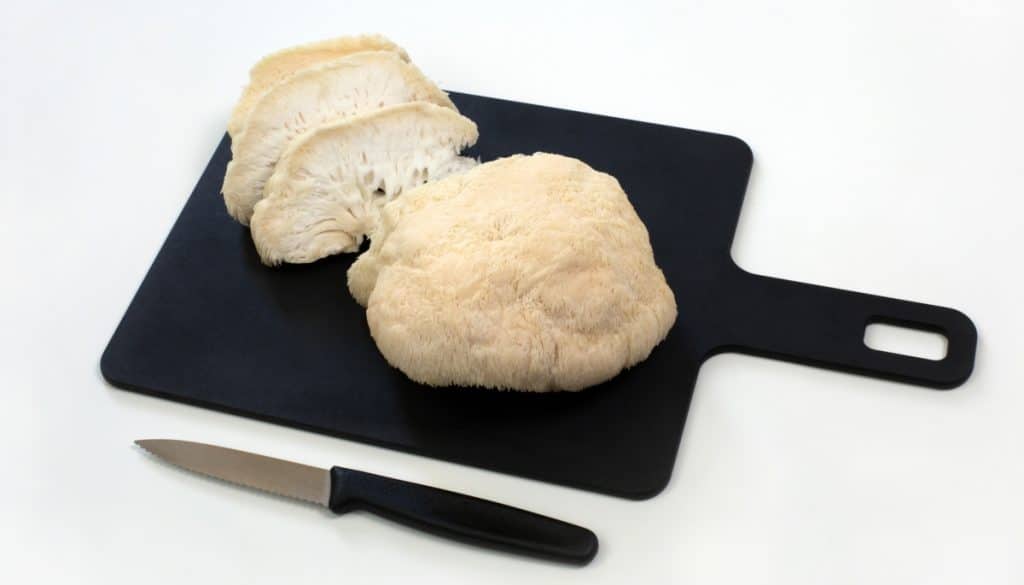
How to Include Lion’s Mane Mushrooms in Your Diet
There are several ways to consume lion’s mane mushrooms, and which is best for you will depend on several factors, including:
- Where you live, you may not have access to fresh lion’s mane in your area.
- Whether you are consuming them for their unique taste and texture or are primarily interested in the health benefits they offer.
- The amount of time you have available, as preparing and cooking fresh lion’s mane can take a while. Tinctures and powders are very convenient for busy people.
The first way to consume lion’s mane is to prepare and enjoy fresh lion’s mane mushrooms. They are very versatile, and you can cook them in several different ways.
Our article, “How to cook lion’s mane mushroom,” has more information and several recipes for you to try.
You can also get dried lion’s mane mushrooms in powdered form, and using this powder in beverages and meals will provide the same benefits as eating fresh lion’s mane.
But if your main reason for consuming lion’s mane is their incredible health benefits, then lion’s mane extracts are the best option.
To make the beneficial compounds in lion’s mane more available, growers extract them using alcohol or hot water.
Extracts made using the dual extraction method are best as they contain both the alcohol and water-soluble compounds found in lion’s mane.
Our favorite way to consume lion’s mane is double extract tinctures, as they’re very convenient, and all you need are a few drops under your tongue daily.
And if you don’t like the taste, you can add the drops to your favorite beverage.
You’ll also find lion’s mane extracts sold as powders and capsules. A tincture is freeze-dried and then powdered to create these supplements.
Dual extract lion’s mane mushroom powder is more potent than plain powdered lion’s mane, so this is the powder you want to take.
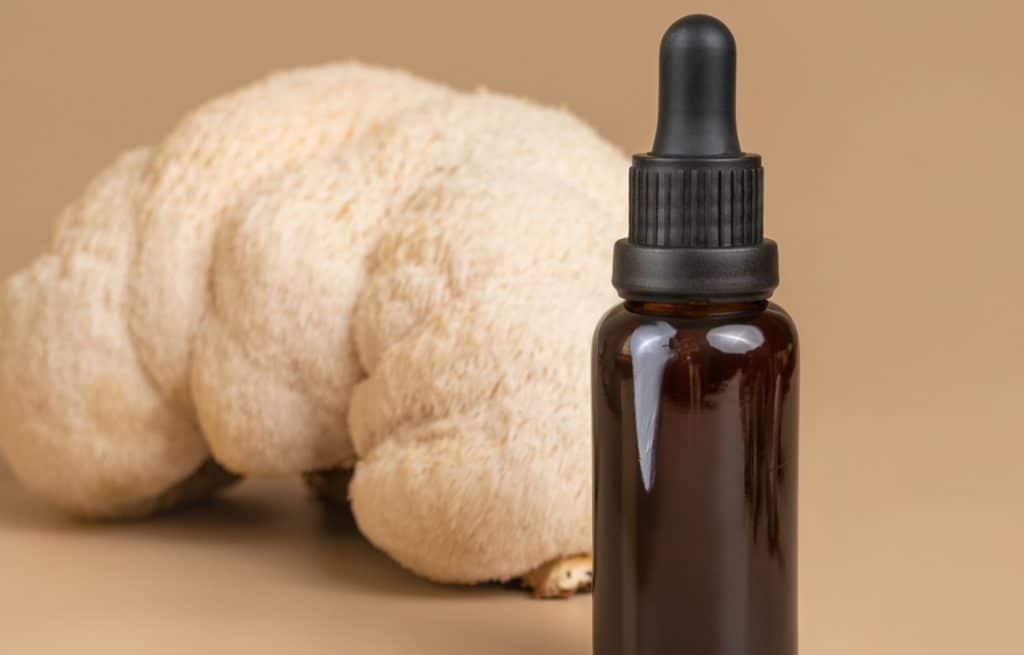
What to Look for When Buying Lion’s Mane Supplements
As mentioned above, if you want maximum lion’s mane mushroom supplement benefits, extracts are the way to go, as they provide more beneficial compounds.
So, take the time to read product labels carefully before purchasing them. Check tinctures to confirm they’re made using the dual extraction method.
And, when purchasing lion’s mane powder, ensure it’s powdered extract and not just dried lion’s mane that growers have powdered.
Another tip is to always buy extracts from a reputable supplier that makes the extract using only lion’s mane fruiting bodies, and it’s even better if they’re organically grown.
Although lion’s mane mycelium contains similar beneficial compounds to the fruiting bodies, separating the mushroom mycelium from the substrate it’s grown on is challenging.
Supplements made from lion’s mane mycelium usually also contain some of the substrate grain, reducing the strength of the supplement.
We also recommend buying supplements from organically certified local growers rather than large commercial companies that often import organic medical mushrooms from China.
Apart from the supplements above, you’ll also find lion’s mane in blends with other medicinal mushrooms and in several innovative products, including hot chocolate, coffee, and energy bars.
If you want to try these products, check the label to ensure they contain enough lion’s mane to provide the health benefits you’re after.
If you live in the UK and are looking for a high-quality lion’s mane supplement, check out our list of 10 of the best lion’s mane supplements in the UK.
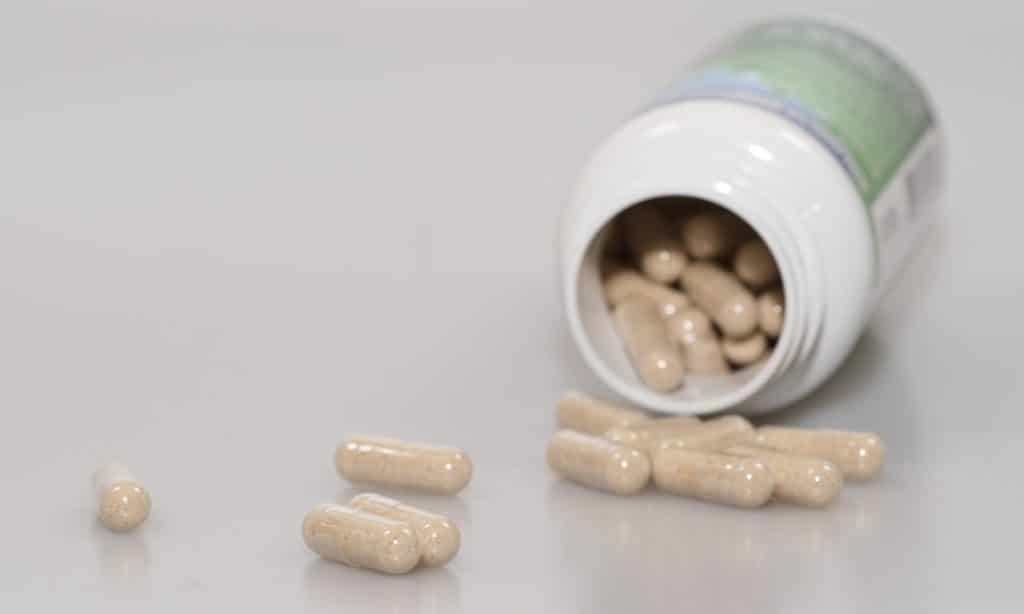
Lion’s Mane Dosage
The correct lion’s mane dosage for you will vary depending on the type of extract you’re using, so it’s always best to follow the instructions on the label of any supplements you buy.
Recommended powdered extract dosage can be anywhere from 500mg to 2 g daily, and tinctures 1 to 2 ml daily.
If you’re trying lion’s mane for the first time, start with a lower dose and see how you feel before increasing the dose.
When to Take Lion’s Mane
There is no set rule for when to take lion’s mane, and timing will vary depending on your lifestyle and which benefits you hope to enjoy.
Many recommend taking it early before a busy workday to improve focus, mental clarity and memory. Early afternoon is also a suggestion, as lion’s mane may help prevent a late afternoon dip in focus and concentration.
Others feel that the best time to take lion’s mane supplements is before bed, as it may help you wind down and get a better night’s sleep.
But there is some debate around this, as studies suggest you’ll still experience improved sleep if you take lion’s mane in the morning.
This is because lion’s mane has the ability to stabilize cortisol levels, reduce stress and improve cognitive function throughout the day, resulting in better sleep.
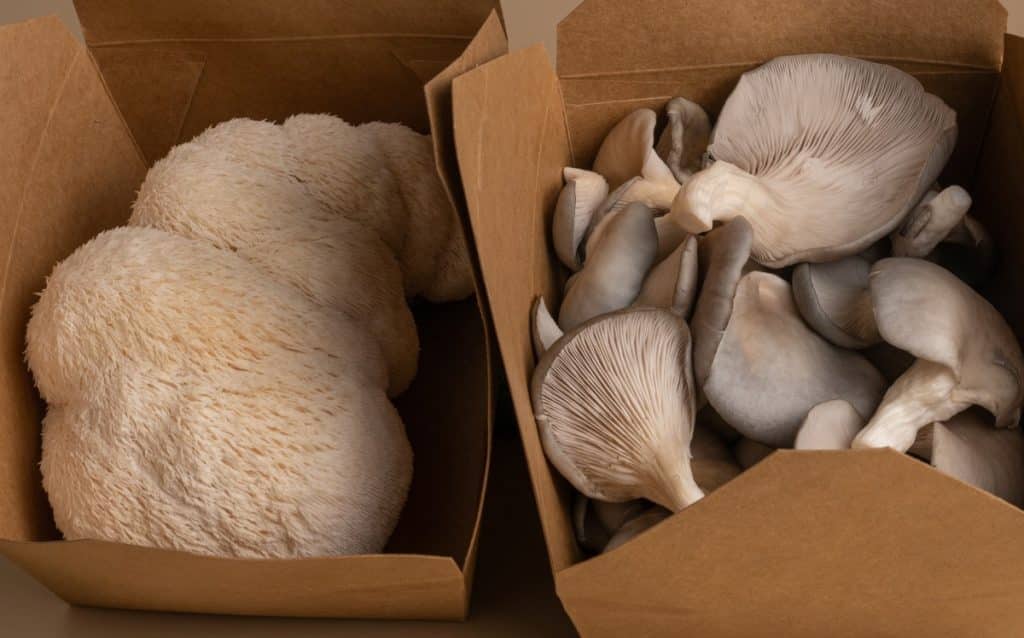
Where to Buy Lion’s Mane Mushrooms
As scientists complete more studies and people understand more about lion’s mane mushroom benefits, they’re increasing in popularity, and more farmers are growing them.
This means you could be lucky enough to find fresh lion’s mane at grocery stores, specialty stores and farmer’s markets near you.
Depending on where you live, there may even be local mushroom farmers who offer regular deliveries of fresh lion’s mane.
But the best way to ensure an ongoing supply of fresh lion’s mane is to grow your own at home, and they’re one of the easier mushroom species to cultivate.
Lion’s mane supplements are a little easier to find as you can buy them online. Remember to buy from a recognized and reputable supplier and, if possible, support smaller local producers.
Risks and Side Effects of Consuming Lion’s Mane Mushrooms
Lion’s mane is generally considered non-toxic and safe to consume for extended periods, but scientists have only conducted studies exploring its safety using animals.
Here are some potential risks to be aware of before you add lion’s mane to your diet:
1. Allergies and Sensitivities
People with known mushroom allergies should approach lion’s mane cautiously.
Although uncommon, allergic reactions can occur, and a few people have reported allergic reactions to lion’s mane, including abdominal pain, nausea and skin rashes.
Start with a small dose if you’re new to lion’s mane to gauge your body’s response.
2. Gastrointestinal Discomfort
While generally well-tolerated, some people may experience mild gastrointestinal discomfort, including bloating, flatulence and digestive changes.
Adjusting the dosage or taking lion’s mane with food can sometimes alleviate these symptoms.
3. Medication Interactions
If you’re currently taking medications or have pre-existing health conditions, it’s wise to consult with a healthcare professional before taking lion’s mane supplements.
For example, lion’s mane mushrooms’ ability to modulate blood clotting may interfere with anticoagulant drugs and result in unwanted bleeding or bruising.
And, if you’re taking diabetes medications, you’ll need to keep an eye on your blood sugar readings as lion’s mane helps lower blood glucose levels, and you may need to adjust your dosage.
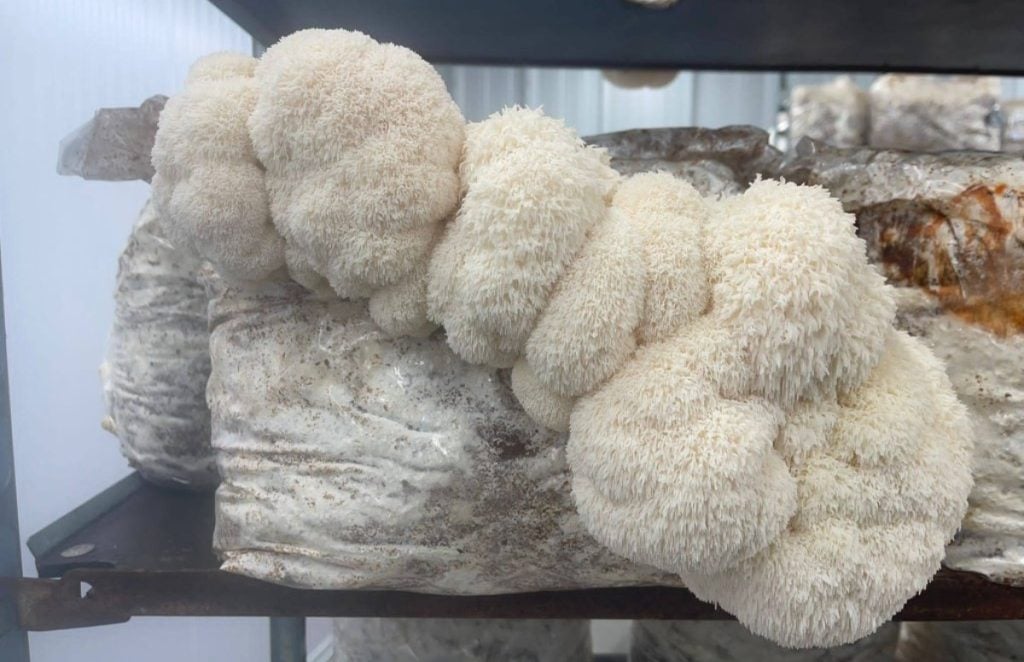
Final Thoughts
Lion’s mane are best known for their positive impact on brain health and the nervous system.
They are exceptionally beneficial because they contain two important compounds, hericenones and erinacines, that can cross the blood-brain barrier.
Once inside the brain, these compounds help to protect it from injuries and stimulate the growth of new neurons.
Recent growth in the popularity of lion’s mane has resulted in the development of several new supplements, blends and products containing lion’s mane extract that are widely available online.
But, finding fresh lion’s mane mushrooms is not always as easy, and one of the best ways to ensure a consistent supply of high-quality lion’s mane is to grow your own.
To learn more about gourmet and medicinal mushrooms and how to grow them, visit our Mushroom Growing Hub, where you’ll find free resources to help you get started.
